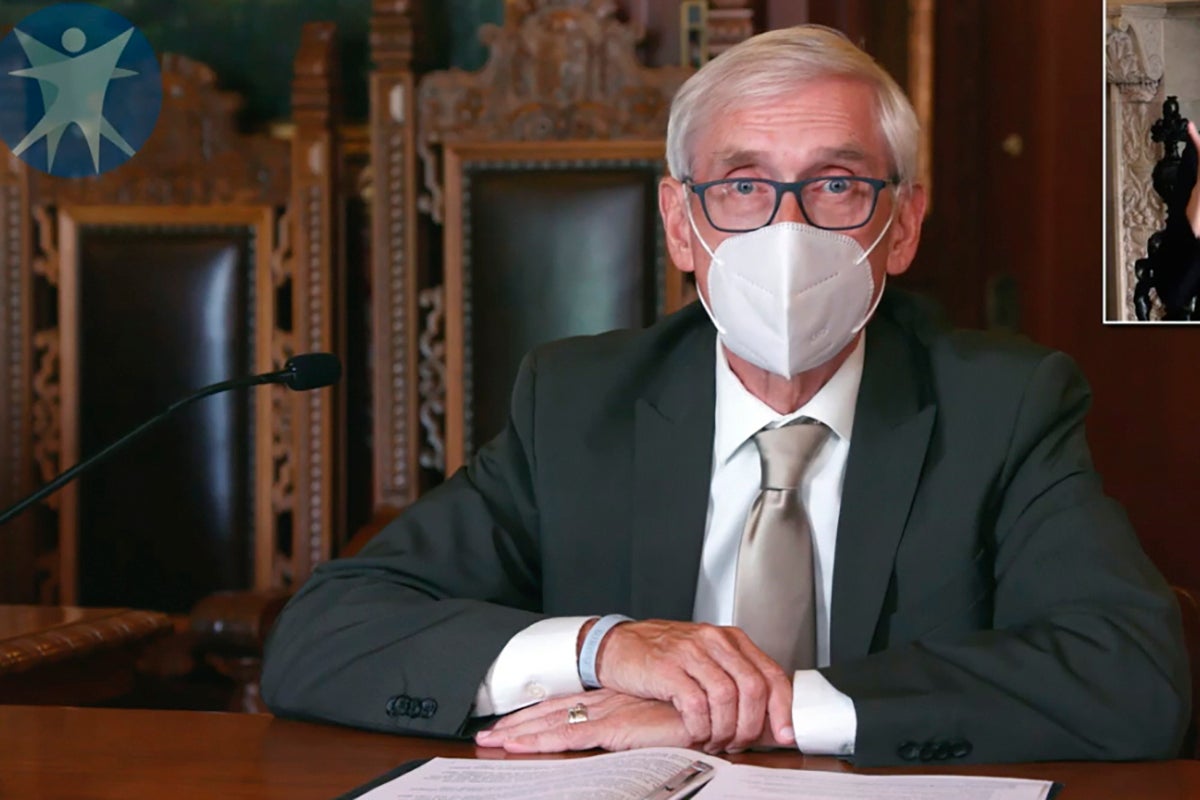Wisconsin Supreme Court strikes down governor's mask mandate
The Wisconsin Supreme Court has struck down Gov. Tony Evers’ statewide mask mandate, ruling that the Democratic governor exceeded his authority by unilaterally extending the mandate for months through multiple emergency orders

Your support helps us to tell the story
From reproductive rights to climate change to Big Tech, The Independent is on the ground when the story is developing. Whether it's investigating the financials of Elon Musk's pro-Trump PAC or producing our latest documentary, 'The A Word', which shines a light on the American women fighting for reproductive rights, we know how important it is to parse out the facts from the messaging.
At such a critical moment in US history, we need reporters on the ground. Your donation allows us to keep sending journalists to speak to both sides of the story.
The Independent is trusted by Americans across the entire political spectrum. And unlike many other quality news outlets, we choose not to lock Americans out of our reporting and analysis with paywalls. We believe quality journalism should be available to everyone, paid for by those who can afford it.
Your support makes all the difference.The Wisconsin Supreme Court struck down Democratic Gov. Tony Evers statewide mask mandate Wednesday, stripping the governor of one of his last remaining tools to curb large-scale spread of COVID-19 as the state stands on the precipice of another surge in infections.
The conservative-leaning court ruled 4-3 that Evers violated state law by unilaterally issuing multiple emergency orders to extend the mandate for months. The court found Evers needed legislative approval to issue more orders after the initial 60-day mandate he issued in August expired.
“The question in this case is not whether the governor acted wisely; it is whether he acted lawfully. We conclude he did not,” Justice Brian Hagedorn wrote for the majority.
The decision marks another legal defeat for Evers. The Supreme Court in May struck down his stay-at-home order, finding that his health secretary lacked the authority to issue such an order. A state appeals court blocked Evers' attempts to limit capacity in bars, restaurants and other indoor places in October.
Wednesday's decision comes as COVID-19 cases have been rising in the state. The seven-day average has jumped from fewer than 400 cases in mid-March to 501 on Tuesday. State Department of Health Services Secretary Julie Willems Van Dijk said the state is seeing “warning signs” that another surge in infections is about to begin.
Local mask mandates remain in place. Milwaukee and Dane County, home to the state capital of Madison both have issued such mandates. But invalidating the statewide order leaves Evers with few options to control spread on a broad scale.
Evers spokeswoman Britt Cudaback didn’t immediately respond to a message seeking comment. Justice Ann Walsh Bradley, a member of the court’s three-justice minority, lamented in a dissent that the ruling hampers the ability of governors in Wisconsin to protect lives.
“This is no run-of-the-mill case,” she wrote. “We are in the midst of a worldwide pandemic that so far has claimed the lives of over a half million people in this country. And with the stakes so high, the majority not only arrives at erroneous conclusions, but it also obscures the consequence of its decision. Unfortunately, the ultimate consequence of the majority’s decision is that it places yet another roadblock to an effective governmental response to COVID-19.”
Democratic Attorney General Josh Kaul who defended the mask order, issued a statement urging people to continue to wear masks.
Republican lawmakers applauded the ruling. Senate Majority Leader Devin LeMahieu said in a statement that Evers abused his power and the court's decision affirms the separation of powers between the legislative and executive branches.
"The governor’s repeated abuse of emergency powers and pervasive violation of state statute created a state of chaos and had to be stopped," LeMahieu said.
Evers had argued that he can issue multiple health emergencies because of the changing nature of the pandemic. The mask order first took effect in August and Evers extended it four times since then, most recently on Feb. 4 immediately after Republican legislators repealed it.
Nearly 60 organizations opposed repeal of the mask mandate, including groups representing hospitals, doctors, nurses, EMTs, school administrators, businesses, children, unions, Milwaukee schools, American Indian tribes, pharmacists, firefighters, local health departments, senior citizens, churches and dentists.
Hagedorn joined with the liberal justices in supporting Evers stay-at-home order in May, when conservatives held a 5-2 majority. His stance then gave Democrats hope that he would cast the deciding vote to uphold the mask mandate. But during oral arguments in the mask case on Nov. 16, Hagedorn questioned Evers’ authority to renew health emergencies beyond the 60-day limit. He said it was an “extraordinary grant of short-term power to the governor” and that “it seems like the Legislature wanted to allow for only a very short period of time.”
The case challenging the mask mandate was brought by Jere Fabick, a major Republican donor in Wisconsin who has given more than $350,000 to Republican or conservative candidates in Wisconsin between 1994 and the middle of 2020, according to the Wisconsin Democracy Campaign.
In 2016, Fabick gave $20,000 to conservative Wisconsin Supreme Court Justice Rebecca Bradley. Fabick is a board member and policy advisor for The Heartland Institute, a free-market think tank, and also the president of a multi-state Caterpillar equipment and engine dealer.
___
Associated Press writer Scott Bauer contributed to this report.